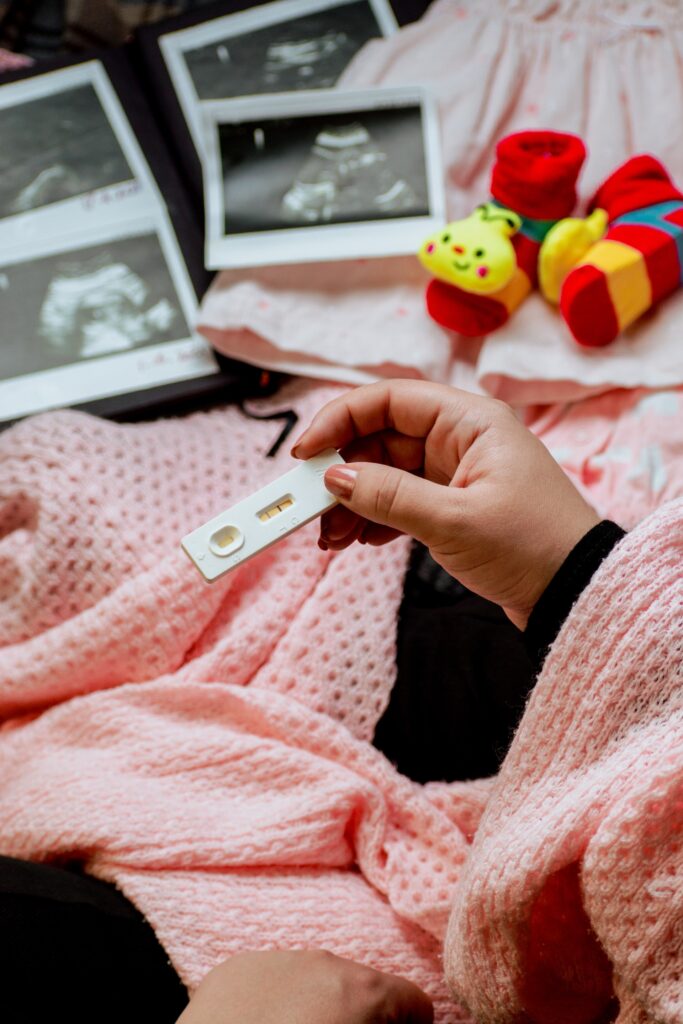For many women, the first week of pregnancy can bring a range of emotions from excitement to apprehension. We usually measure pregnancy in weeks, but did you know it starts from the first day of a woman’s last menstrual period? This helps healthcare providers determine an estimated due date for the pregnancy.
Do you want to start a family with your partner? Or are you simply doing your research to help you prepare for your journey? Either way, you’ve come to the right place. Let’s talk about what’s happening to your body in week 1 of your pregnancy!
Your Body During Pregnancy Week 1
Because we typically measure pregnancy from the first day of your last menstrual cycle, it means you’re not technically pregnant in the first week. The product of conception has not yet implanted itself in the uterus, and the placenta has not yet formed.

During this week, your body sheds the uterine lining it built during your last menstrual period. Then, your uterine lining builds up again to prepare for pregnancy. This will hold your hopefully fertilized egg!
Your ovary releases the still unfertilized egg cell into the fallopian tube in the second week, anywhere between the 10th and 19th day of your period. We call this process ovulation. Depending on your cycle, your fertile window happens 5 days before and on the day ovulation occurs. If you want to get pregnant, having sex during this period maximizes your chance of conceiving a baby.
Pregnancy Symptoms at Week 1
Many women hardly notice pregnancy symptoms at this time. In fact, the early signs you experience are because of your menstrual cycle.
- Cramps and Lower Back Pain. Your uterus expels its lining through contractions. This can cause cramps and back pain.
- Headaches. Menstrual migraines typically occur because of the hormone changes in your body.
- Normal or light bleeding. If fertilization did not occur in your last period, the uterus sheds the lining. Your menstrual flow consists of this lining, blood, and mucus from your vagina.
- Bloating. Women experience bloating while on their menstrual period due to fluctuating hormones.
- Mood swings. Fluctuating hormones can also cause these mood swings.

Source: Pexels
You may experience similar early signs, like bloating and light spotting, in the second week and a missed period in the third. When the latter happens, you can take a pregnancy test. You have two options: a home pregnancy test or a blood pregnancy test. These are most accurate a week after your period is due.
In the Doctor’s Office: Schedule an Appointment with Your Healthcare Provider
Preconception and prenatal appointments are different. You schedule preconception appointments before your pregnancy. Meanwhile, you receive prenatal care while you are pregnant.
Preconception
If you’ve been planning your pregnancy, you’ve likely visited your doctor for a preconception check-up. These appointments can happen any time before you get pregnant. However, experts recommend preconception care to begin a minimum of three months prior to your pregnancy.
While you won’t need an ultrasound during week 1 pregnancy, it may be necessary to help you conceive. In case there are problems, your doctor can recommend fertility treatments, preconception vitamins, or lifestyle changes.
Tracking your cycle during preconception will help you and your doctor understand your body better. And when the first day of your last period comes, you’ll be able to determine your fertile window, thus increasing your chances of pregnancy.
Prenatal
It’s important to schedule a prenatal appointment as soon as possible when you confirm your pregnancy. This sets the stage for a healthy pregnancy.

Source: Pexels
Your first prenatal appointment is usually the longest. Your doctor will ask questions about your medical history and family history. They will also perform a physical exam. Likewise, it is important to discuss any medications and supplements are taking, as well as prenatal vitamins you’ll have to take.
This is also the ideal time to ask your doctor questions you may have about pregnancy. Don’t hesitate to ask, even if you think your questions are just one Google search away. If you’re a first-time mom, it’s even more crucial that you understand what you will experience. For you to deliver a healthy baby, they would provide vital information on how to best care for yourself during the next nine months.
During this appointment, you’ll need to make sure that you’re up-to-date on all recommended vaccines, such as the flu shot and the TDAP vaccine. Further, your doctor can require a blood test and urine test to evaluate your risk for any pregnancy-related complications.
Lifestyle Changes
If you’re hoping for a positive pregnancy test, keeping yourself healthy as early as week 1 and even before you’re pregnant is crucial. Fetal growth depends on several factors, including maternal nutrition. Thus, it is important to make certain lifestyle changes to ensure good health.
Prenatal Vitamins

Source: Pexels
Prenatal care is an important aspect of pregnancy and is essential for you and your baby’s health. One important step in prenatal care is to take prenatal vitamins, formulated specially to meet the needs of pregnant women.
Folic Acid
Folic acid is a B-vitamin essential for the normal development of the brain and spine in a developing baby. The Centers for Disease Control and Prevention recommends that all women who can become pregnant consume 400 micrograms of folic acid supplement daily.
During the first trimester, this prenatal vitamin will help prevent major birth defects of the brain and spine, such as spina bifida. Interestingly, you can get gummy versions of this supplement online.
Vitamin D
Also known as calciferol, this fat-soluble vitamin is another important nutrient for pregnant women. It is essential for the absorption of calcium and helps to build strong bones and teeth. Experts recommended pregnant women to get at least 600 to 800 international units (IU) of this prenatal vitamin daily.
Apart from folic acid and calciferol, other micronutrients and minerals should also be part of a pregnant women’s diet, such as calcium, iron, and zinc. This can vary for everyone, so can consult your doctor for your specific needs.
Healthy Diet, Healthy Weight
Maintaining a healthy lifestyle during pregnancy is important for the health of both the expectant mother and the developing baby. During early pregnancy, it is common for expectant mothers to experience changes in appetite and weight. It is normal to experience some weight gain and other physical changes as the body undergoes a new cycle of hormonal changes and prepares for pregnancy.
According to the Cleveland Clinic, you should not go on a diet even if you are gaining weight. You could miss essential nutrients vital to your baby’s growth. If you are having trouble with this aspect of your pregnancy, your doctor can help you create a plan for a balanced diet.
Limit Exercise and Avoid Alcohol or Drugs

Source: Pexels
With exercise, it’s generally a good idea to stay active. Exercise can help you maintain strength, flexibility, and overall health, which can be especially important during this time. It’s recommended to aim for at least 30 minutes of moderate-intensity exercise on most days of the week.
As for drugs, please be cautious about what you put into your body during pregnancy. Peer-reviewed studies show that the intake of tobacco, alcohol, illicit drugs, or misuse of prescription drugs may put the unborn baby at risk for severe health consequences.
Many substances can easily pass through the placenta. Thus, substances that a pregnant woman takes also reach the fetus.
Get Plenty of Rest and Stay Stress-Free

Source: Pixabay
Getting enough rest is essential for your physical and emotional well-being. You need to get at least 7-8 hours of sleep per night. Adequate rest can help reduce fatigue and improve overall physical and mental health.
In addition, staying free of stress is also vital. High levels of stress can have negative effects on both the pregnant woman and her developing baby. Find healthy ways to manage stress, such as through relaxation techniques, exercise, or seeking support from loved ones.
Start Writing a Pregnancy Journal!
Starting a pregnancy journal is a great way to document your pregnancy weeks. It can be a beautiful way to record your thoughts and emotions, changes in your body, your baby’s development, and even the little moments you never want to forget.
Every week, write any recent developments or observations you’ve made. This may be about your missed period, early pregnancy symptoms such as breast tenderness, or the growth of your baby. Your journal will become a treasured piece of your pregnancy journey that you’ll look back on fondly in years to come.

Source: Pexels
Overall, whether you’re trying to become pregnant, already expecting, or are a parent of a baby or toddler, know that you’re not alone. Preggy to Mommy is here to provide as much information as possible from being pregnant to being a loved parent.
Frequently Asked Questions
What precautions should I take during pregnancy?
Even before trying to become pregnant, you should definitely take care of your body well. Maintain a healthy diet and lifestyle. Eat a variety of fruits, vegetables, and whole grains, and avoid unhealthy or sugary foods. Likewise, stay away from smoking and alcohol, as these substances can be harmful to the developing baby.
It is also a good idea to practice good hygiene before and during pregnancy to help protect your health. This may include washing your hands frequently and avoiding close contact with sick individuals. You should an also avoid certain activities or environments that may pose a risk of injury or infection.
Ask for more information from your healthcare provider during your prenatal visits.
Should I schedule a preconception visit?
Here, a healthcare provider will assess your current health and discuss any medical conditions or risk factors that may impact your condition. They will also provide recommendations for optimizing your health before pregnancy and address any concerns you may have.
Some advantages include:
- To address any medical conditions or risk factors: If you have a medical condition, such as diabetes or epilepsy, it is important to manage it before becoming pregnant to reduce the risk of complications during pregnancy.
- To discuss reproductive medicine: This is an excellent opportunity to discuss family planning and birth control options.
- To discuss lifestyle factors: Your healthcare provider can discuss helpful tips for your diet, exercise, and stress management. Other recommendations include decreasing caffeine intake, quitting smoking or avoiding alcohol.


